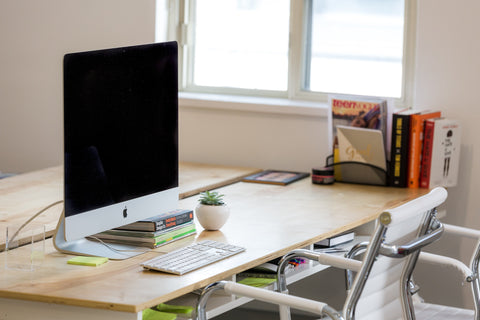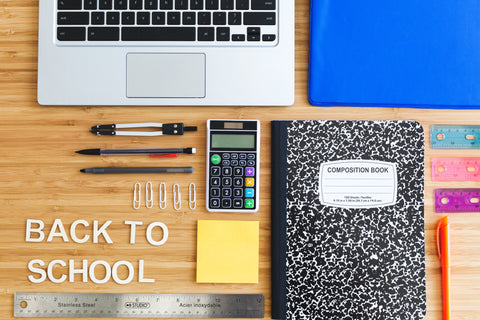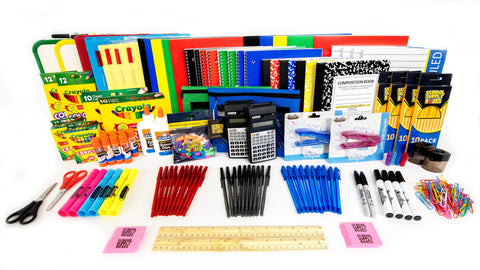Not all of us are the greatest at staying on top of the day to day things that need to get done. With so many things going on, even the best of us are bound to forget a task or an assignment every now and then. While most things might be harmless to forget every once in a while, missing a meeting or opportunity regularly can be damaging to anyone professionally or academically.
When yours truly was in middle school, there was a big push to keep all the students organized. To help us keep track of things, each student was issued a school planner at the beginning of the school year. Of course, this was a time before the invention of the iPhone and smartphones. Some of us used the planners, most kids just used it for drawing and remembering friend’s birthdays. But I took many of the tips to heart.
Whatever it was they taught me in middle school stayed with me all the way through high school. Staying organized and keeping your organizational skills sharp should be important to any professional or student. Making sure everything has a place and you’re keeping the most important information kept somewhere you can find it is the best way to make sure you never miss out on something important.
Think of organization as another word for control. You’re controlling what gets done and when. You’re also in control of all the paperwork and information you’re collecting on a daily basis.
Bad with Dates? Write Them Down!
Unless you’ve got some kind of superhuman brain that allows you to remember every single thing you have to do without any sort of reminder written down, always take the time to write down important dates, meeting times, or things you want to get done.
If you own a smartphone like most people these days, there is no shortage of apps for both Android and iOS that can help you keep track of important dates and times.
But, say you’re old school like me and you don’t want to be tied to your phone all the time. The next best thing would be to keep a physical planner. Monthly and yearly planners might be a bit old fashioned, but they’re still used by many professionals to keep track of things. The benefit of monthly and yearly planners is you never have to worry about running out battery at horrible times or looking for charging cables. Nothing beats the reliability of an old fashioned piece of paper.
If you don’t feel like shelling out a few bucks for a proper monthly or yearly planner, you could always go the less fancy route and simply keep a notebook. Create your own basic system so you write down important information like dates, times, events, or anything else you feel is important. Keep the notebook in our bag as you would your monthly planner. Use a permanent marker to write on the cover so you know which notebook is your datebook. It’s cheaper than a planner but just as effective.
Keep Those Important Papers Together
I’m not sure about you, but loose papers in a backpack or even on my desk drive me nuts. If you’re a student, it’s only natural for you to start collecting papers and just shoving them into your backpack and dealing with the later. It’s that later part that always comes back to haunt us in the end.
Once too much time has passed, we often forget why it was we even needed those papers in the first place. But nothing is worse than needing one single piece of paper that turns out to be incredibly important, only to find it later when you don’t need it anymore. It happens to just about everyone and always at the worst possible time.
But don’t worry because that’s why they created binders and folders! Three-ring binders are the classic organizational tool for both students and professionals alike. Pair them together with classic yellow dividers, and you have the perfect system of organization for your classes or important paperwork. Make sure you properly label your tabs so you know which papers go where.
If you don’t feel like carrying a bulky binder in your bag, you can simply add those dividers to a folder. The disadvantage of using a folder versus using a binder is that three-ring binders are made to be able to add papers easily, whereas folders are made for simply holding papers in place with brads. You can still add papers, but it’s just not as easy as with a binder. So, if you intend to use a folder to keep your papers organized, make sure you don’t need to add or remove papers often. For example, if you have a large set of instructions that won’t be changing anytime soon, separating them using dividers in a folder will work just fine.
A Cluttered Mind Needs Sleep
This might seem like a strange tip for staying organized, but being well rested is incredibly important when it comes to keeping your mind sharp and focused. If your brain is foggy because you’re not getting enough sleep, you’ll be horribly inefficient during the day while even performing the most simplest of tasks.
Getting a restful night’s sleep has many benefits including improved mental focus and your ability to retain information much more easily. Not only will you be able to have better concentration when you’re studying work working, but you’ll be able to remember new skills and remember important information without needing to write things down as much.
Another benefit of getting enough rest is improved moods. If you find yourself being a pretty grumpy goose often and you know it’s because you’re not getting enough sleep or rest, creating a proper sleeping schedule and sticking to it can help your brain and your mood improve significantly.
Sticky Notes are Your Friend
Sticky notes, famously known as Post-It Notes, can be a big help when you’re reading and need to take notes on the fly. They also double as great book markers when you need to find information in a textbook quickly. They’re also useful when you need to make notations and you can’t use a highlighter to mark up the book or notes.
Most sticky notes come in the classic yellow color, however you can up your organization game by getting sticky notes in multiple colors so you can use specific colors for specific information.
Besides using them for important bookmarkers, keep a few on your desk or in your bag so you can quickly jot down important information.
Set a Schedule and Keep It
You know yourself better than anyone else. Therefore, you know when you’re the most and least productive during the day. By knowing when you’re more focused to work or study, you can set up a schedule for yourself to actually work on things when you know you’ll be the most focused.
Creating a schedule also allows you to see where you’re spending most of your time and how you can better manage it so you not only have enough time to get multiple tasks done during the day, but also make sure you’re making time to recover.
Are you an early riser and a morning person? Add a few simple tasks to the start of your morning so you don’t end up having to do them at the end of the day when you’re definitely in no mood to do them.
Scheduling is incredibly necessary for anyone who has a busy professional or academic life. Noting when you have class and when your assignments are due is a great way to visually see how long you have to prepare or complete these tasks. Get them done early and you have more time for other things. But creating a schedule also leads us to another important tip.
Get Procrastination Under Control
If there’s one thing that will throw off your attempt at becoming more organized it's your own procrastination. Worked hard to set up that schedule to help you stay on task? Procrastinating can set those plans up in smoke. Bought those binders and folders to keep your papers and work together and easy to find? They’ll do you no good if you’re being too lazy to actually organize them inside those binders and folders.
If you know you’re going to have trouble with these tips in the early beginning or you know you’re a procrastination champion, it might be best to have a buddy to help you and hold you accountable until you finally get your new organizational habits down cold.
Don’t Pile on Too Much
Part of being organized isn’t just about keeping track of all the things you need to do, people to see, places to go. It’s also about being able to visualize everything that needs done in a simplified way so you can see how much you’re actually doing.
If increasing your organizational skills has allowed you to have a bit more time because you’re able to complete things sooner and faster, decide if you want to use the extra time for yourself or take on something new. But make sure if you’re planning on adding things to your schedule that it isn’t going to become overwhelming later on.
Get Started and Keep It Up
Once you’ve started getting a hold of your schedule, your mountain of paperwork, and all of those things you need to remember, you’ll need to do your best to stick with it. Eventually, after maintaining a few basic organization skills, you’ll slowly develop new and better habits that keep you even more organized.
But being organized has the hidden benefit of making you look incredibly professional. Companies and organizations are always looking for people who know how to get a handle on things efficiently. Great organizational skills aren’t something you can learn in school and the more you learn and build up those skills, the more marketable you become.
What kinds of ways do you like to keep yourself organized? Do you have a special technique to keep procrastination at bay? Leave a note in the comments section and share some of your best tips.




Comments (0)
There are no comments for this article. Be the first one to leave a message!